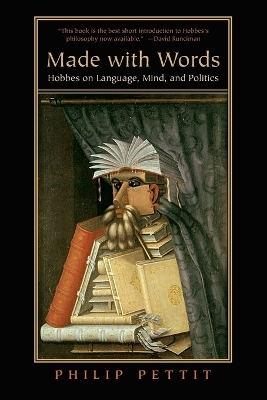
Made with Words
Hobbes on Language, Mind, and Politics
Seiten
2009
Princeton University Press (Verlag)
978-0-691-14325-5 (ISBN)
Princeton University Press (Verlag)
978-0-691-14325-5 (ISBN)
Hobbes' extreme political views have commanded so much attention that they have eclipsed his work on language and mind, and on reasoning, personhood, and group formation. This book argues that it was Hobbes who invented the invention of language thesis - the idea that language is a cultural innovation that transformed the human mind.
Hobbes's extreme political views have commanded so much attention that they have eclipsed his work on language and mind, and on reasoning, personhood, and group formation. But this work is of immense interest in itself, as Philip Pettit shows in Made with Words, and it critically shapes Hobbes's political philosophy. Pettit argues that it was Hobbes, not later thinkers like Rousseau, who invented the invention of language thesis--the idea that language is a cultural innovation that transformed the human mind. The invention, in Hobbes's story, is a double-edged sword. It enables human beings to reason, commit themselves as persons, and incorporate in groups. But it also allows them to agonize about the future and about their standing relative to one another; it takes them out of the Eden of animal silence and into a life of inescapable conflict--the state of nature. Still, if language leads into this wasteland, according to Hobbes, it can also lead out.
It can enable people to establish a commonwealth where the words of law and morality have a common, enforceable sense, and where people can invoke the sanctions of an absolute sovereign to give their words to one another in credible commitment and contract. Written by one of today's leading philosophers, Made with Words is both an original reinterpretation and a clear and lively introduction to Hobbes's thought.
Hobbes's extreme political views have commanded so much attention that they have eclipsed his work on language and mind, and on reasoning, personhood, and group formation. But this work is of immense interest in itself, as Philip Pettit shows in Made with Words, and it critically shapes Hobbes's political philosophy. Pettit argues that it was Hobbes, not later thinkers like Rousseau, who invented the invention of language thesis--the idea that language is a cultural innovation that transformed the human mind. The invention, in Hobbes's story, is a double-edged sword. It enables human beings to reason, commit themselves as persons, and incorporate in groups. But it also allows them to agonize about the future and about their standing relative to one another; it takes them out of the Eden of animal silence and into a life of inescapable conflict--the state of nature. Still, if language leads into this wasteland, according to Hobbes, it can also lead out.
It can enable people to establish a commonwealth where the words of law and morality have a common, enforceable sense, and where people can invoke the sanctions of an absolute sovereign to give their words to one another in credible commitment and contract. Written by one of today's leading philosophers, Made with Words is both an original reinterpretation and a clear and lively introduction to Hobbes's thought.
Philip Pettit is the Laurance S. Rockefeller University Professor of Politics and Human Values at Princeton University. His books include "The Common Mind", "Republicanism", and "Rules, Reasons, and Norms". A collection of papers on his work, "Common Minds: Themes from the Philosophy of Philip Pettit", appeared in 1997.
Introduction 1 Chapter One: Mind in Nature 9 Chapter Two: Minds with Words 24 Chapter Three: Using Words to Ratiocinate 42 Chapter Four: Using Words to Personate 55 Chapter Five: Using Words to Incorporate 70 Chapter Six: Words and the Warping of Appetite 84 Chapter Seven: The State of Second, Worded Nature 98 Chapter Eight: The Commonwealth of Ordered Words 115 Summary 141 Notes 155 References 169 Index 177
| Erscheint lt. Verlag | 26.7.2009 |
|---|---|
| Zusatzinfo | 1 line illus. |
| Verlagsort | New Jersey |
| Sprache | englisch |
| Maße | 152 x 235 mm |
| Gewicht | 28 g |
| Themenwelt | Geisteswissenschaften ► Philosophie ► Philosophie der Neuzeit |
| Geisteswissenschaften ► Philosophie ► Sprachphilosophie | |
| Sozialwissenschaften ► Politik / Verwaltung ► Politische Theorie | |
| ISBN-10 | 0-691-14325-0 / 0691143250 |
| ISBN-13 | 978-0-691-14325-5 / 9780691143255 |
| Zustand | Neuware |
| Haben Sie eine Frage zum Produkt? |
Mehr entdecken
aus dem Bereich
aus dem Bereich


